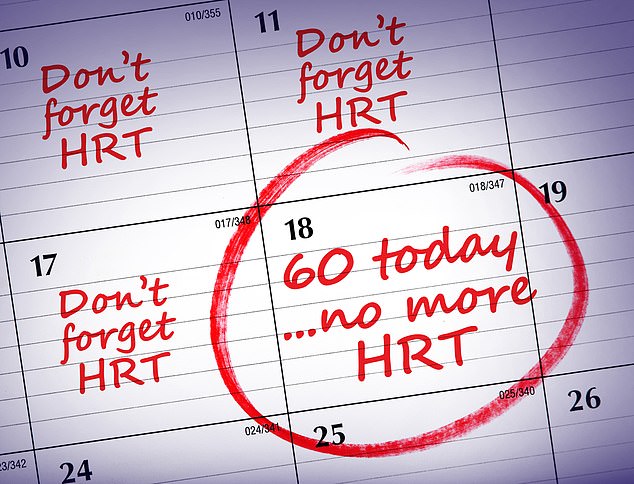More than two million British women take hormone replacement therapy – better known as HRT.
The drugs, which mimic female hormones that naturally dwindle in mid-life, ease some of the worst problems of the menopause. And for many they are a lifeline, banishing hot flushes and night sweats, levelling out mood changes and tackling intimate issues.
But now health guidelines from the US insist some forms of HRT should be snatched away when a woman turns 60 – claiming the benefits are far outweighed by serious risks from side effects. So what is going on?
Until relatively recently, partly due to concerns about side effects, the NHS instructed doctors to offer the treatment at the lowest dose required to control symptoms, for the shortest time needed. But over the past decade, things have become far more relaxed.
There has been a sea-change in medical understanding of the risks of HRT, which most experts agree were overstated previously.
And this month, the NHS prescribing watchdog published updated guidance for medical management of the menopause.
Primarily aimed at GPs, it talks of a ‘tailored approach’ that can be adapted ‘if symptoms change over time’.

Health guidelines from the US insist some forms of HRT should be snatched away when a woman turns 60 – claiming the benefits are far outweighed by serious risks from side effects

Jo Ibbott is at a higher risk of breast cancer but insists she will take HRT for life
Discussion of risks and an annual review is recommended. And, if symptoms persist, it suggests a referral to a specialist. But there is no mention of stopping – or even a hint of a cut-off date.
The mood, perhaps, echoes sentiments of a growing minority of doctors that women can, and even should, take HRT for life. They argue the benefits go far beyond symptom control, and claim the drugs help prevent heart disease and even dementia.
In the US, however, a different picture has emerged. Talking specifically about HRT in tablet form, the American Stroke Association and American Heart Association together warned that, past this age, the risk of it triggering a stroke outweighs any benefit.
It should be noted that in the UK the vast majority of women use HRT gels, sprays or patches, which are newer and hoped to be safer than the older tablet type.
However, speaking to The Mail on Sunday, the lead author of the US guidance was clear: based on current best evidence, most women 60 and over should not be on HRT in any form.
Dr Cheryl Bushnell, professor of neurology at Wake Forest University, North Carolina, said: ‘HRT is not really for older women who are ten years or more from the menopause, because it’s not safe.’
The statement may come as a shock to the estimated 620,000 British women over 60 who are on HRT. Some, like Dame Joan Collins, 91, credit it for their long life and good health (see panel below).
And in recent years, some high- profile doctors have even made bold claims that HRT prevents heart attacks and strokes – which makes the US move all the more confusing.
But Dr Bushnell insisted that while the risks were low for younger women, those over 60 ‘should only be considering HRT if they have moderate to severe hot flushes, night sweats, or both’ She added:
‘If you don’t have these, then you are not the ideal candidate for HRT.’
It’s not a line that is likely to go down well with many women in the UK.
Last week, Mail on Sunday columnist Dr Ellie Cannon discussed the possibility of introducing an upper limit on the length of time that women can take HRT – and countless readers reacted to it with dismay.
One 76-year-old reader said her HRT has meant that she’s never ill, depressed or ‘fat’. Another said the drug would have to be pried from her ‘cold, dead hands’ because of its miraculous effect on her brain fog.
So what’s the truth – is taking HRT past the age of 60 as risky as the Americans suggest? We spoke to some of the leading experts who say the answer is: it’s complicated.
HRT is, unarguably, a highly effective treatment. While not all women suffer menopausal symptoms, roughly 75 per cent do – and a quarter rate their problems as severe. Studies show HRT can reduce hot flushes and sweats, which can impact sleep, by up to two-thirds, which improves quality of life.
NHS guidance states that HRT may also be offered for low mood associated with menopause. And there is evidence it reduces the risk of fractures in women with the bone-thinning disease osteoporosis.
In 2022, a joint statement from the British Menopause Society, the Royal
College of Obstetricians And Gynaecologists and the Society For Endocrinology said: ‘For most women, HRT has a favourable benefit/risk profile.’
However, as women age, the picture may change. There is no doubt menopause itself is bad news for the heart. The fall in oestrogen levels changes the way the body stores fat, which increases the risk of type 2 diabetes and heart disease. Insomnia, too, is a risk factor for heart problems.
And all of this increases the chances of a heart attack or stroke.
Can HRT protect against these changes? The answer is yes, in women under 45 who have a premature menopause due to illness or a hysterectomy.
But analysis by medical review body Cochrane Collaboration found in women aged 50 to 59 who took HRT, ten in 1,000 ended up with heart disease, compared with 18 in 1,000 in those who did not take HRT. The authors say this is too small a difference to mean anything. And those on HRT in this age group were also more likely to suffer blood clots, which could trigger a stroke – 11 in 1,000 compared with six in 1,000 not taking HRT.
By comparison, one in 1,000 women taking the contraceptive pill will suffer clots.
This risk increases the longer a woman stays on HRT, the Cochrane study found. Some research suggests it increases the risk of a stroke by as much as a third in women over 60.

The oral version of HRT is raising concerns in the US
Dr Tim Hillard, a consultant gynaecologist at Poole Hospital, Dorset, and a menopause specialist, believes this doesn’t exclude older women from taking HRT completely, but it should be factored into decision-making.
He said: ‘For the small percentage of women who are still getting significant menopause symptoms well past their 60s but are otherwise healthy, I wouldn’t have an issue prescribing HRT.
‘Of the quarter of women with severe menopause symptoms, I would guess no more than 10 per cent are still having hot flushes well into their 80s.
‘So it’s actually a very tiny percent of the population that still need to be on HRT at that age.
‘And though the risks for healthy women are quite small, they’re not nil – so you need to have a reason to be taking it.’
What’s equally important is ensuring that women are on the lowest-risk form of HRT possible, explained Professor Annice Mukherjee, consultant endocrinologist and hormone expert.
‘HRT is not one medication, and a woman’s needs will change over time,’ she said. ‘If you have a healthy woman without high blood pressure, high cholesterol or diabetes that has severe menopause symptoms, she shouldn’t be made to come off HRT simply because of her age.
‘If she’s on oral HRT she should change to transdermal HRT at around 60, at the lowest dose possible, as we think this is lower risk. When you add complex health issues, older age and longer-term treatment, even with transdermal HRT, the risks can mount.’
Prof Mukherjee added: ‘Women with health issues, such as high blood pressure and high cholesterol, should be wary of believing the hype that HRT can protect the heart. We don’t have enough data that looks specifically at women with seriously complex health issues – so, for them, it’s much riskier and the safety is unknown.’
In recent years HRT has boomed in popularity, thanks to high-profile campaigners such as TV presenter Davina McCall who have advocated its benefits. However, many experts have raised concerns that it is increasingly being seen as panacea for all of mid-life’s problems.
It’s something that has worried endocrinologist Professor Susan Davis, a world-leading expert on menopause hormone therapies who told the MoS: ‘HRT is not the elixir of youth – taking it should be contingent on having ongoing symptoms that are sufficiently unpleasant to live with. Not every woman should be on HRT and not every woman needs HRT.’
She added that, ‘it’s up to women to decide when their symptoms are sufficiently unpleasant to require taking it’.
Stroke and heart problems, it should also be added, are not the only risks of the medication. Women who have previously had or have breast cancer are generally advised not to take HRT, as it can increase the risk of it returning. But breast cancer is also more likely to occur in women on HRT.
‘The risk is small but it increases with age and duration,’ said Dr Hillard. ‘For women who have been on HRT longer than ten years, this has to be factored into the pros and cons.’
Another, less-researched risk, is dementia. ‘There is no convincing evidence that HRT protects against dementia but there is some evidence that starting HRT over the age of 65 may increase the risk of developing it,’ added Dr Hillard. ‘It’s just another factor to say don’t keep taking something that has no obvious benefit for you – because there may be a risk that we don’t yet know about.’
Despite knowing the risks, several readers who wrote in last week said they will never stop taking HRT.
Women’s coach Jo Ibbott, 54, says she plans to stay on it as long as she can, despite her family history of breast cancer.
‘When I first became perimenopausal, I had a very low mood, anxiety and insomnia – it was horrible,’ she said, explaining that the drugs had solved these issues.
‘I have a high risk of cancer in my family – my mum died of ovarian cancer and my granny and her sister died of breast cancer. But I still think it’s worth it for my quality of life.’
But not all are as confident. Lisa Wilcox, 64, said she considered stopping HRT after her sister underwent a quadruple-bypass surgery in February.
‘I’ve always checked the ‘no’ box about having a history of heart disease in the family on HRT medication review forms, but now all of a sudden there is,’ she said. ‘So I decided I wanted to come off my HRT.’
She added: ‘From what I’d originally read, HRT seemed like this solve-all for all women – it’s almost like a fashionable thing to be on now.
‘But my sister’s operation scared the wits out of me – I didn’t want to put something into myself that could possibly be causing me harm.’
One woman who got in touch had suffered a stroke and believes it could have been triggered by HRT.
‘I was perfectly healthy and active, playing tennis regularly, and have always had low blood pressure and cholesterol,’ said the 76-year-old, who asked to remain anonymous and had been on HRT tablets for more than 20 years.
‘Usually, people who have strokes have heart complaints or other underlying issues, but for me, nothing was found.’
Though doctors brushed off her concerns that the stroke was caused by HRT, they immediately took her off the medication.
‘I was only ever warned about the risk of breast cancer, no one ever said I could have a blood clot from this medication,’ she said. ‘If they had, I would have decided against taking it.’
So what should women do if they want to stop taking HRT – and what other options are there?
Experts say there are several simple lifestyle changes that women can make to help with menopause symptoms.
‘It’s also important women look at factors like sleep, exercise, and diet,’ says Dr Shazia Malik, consultant obstetrician and gynaecologist at The Portland Hospital. ‘Talking therapy can help women navigate the menopause and there is even evidence that over-the-counter supplements like calcium and vitamin D have their benefits.’





